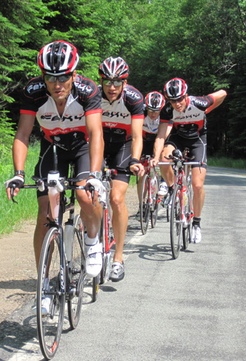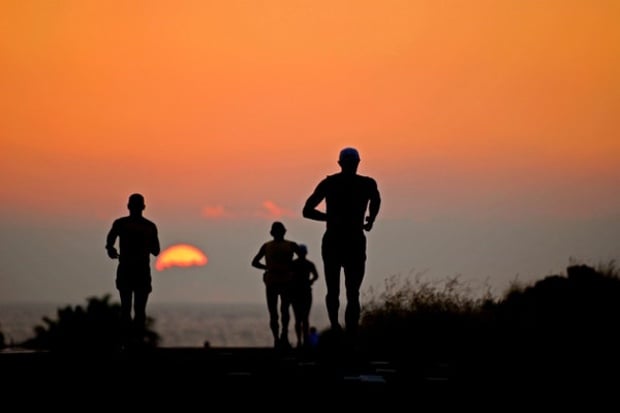At 5 AM, Fabrice Guillaume is on his set of wheels much earlier than most commuters, but he won’t leave for work until about three hours later. Before the sky starts to lighten, and before his wife and two boys have stirred, Guillaume is winding his bike down the roads in the calm of morning.
Those bike rides have been the first of three daily workouts for the 35-year-old Ashburn resident for years leading up to October 13, when he will compete at the Ironman World Championships in Kailua-Kona, Hawaii. But the amateur competitor insists he’s not a super athlete. To hear him tell it, he simply decided to ramp up exercise from something he did to stave off fat until it became a meaningful part of his life.
Like many triathletes, Guillaume started as a runner. In his late twenties, he competed in several races but was bored by the repetition and felt unmotivated. His friends had started swimming and biking to complement their running, and Guillaume followed suit, taking a stab at his first triathlon right around his 30th birthday. Five years later, he’s run a marathon in 2:55 and is set to compete against the best professional triathletes on the planet.
Kona, as the world championships are known, has been a goal of Guillaume’s for two years. Day after day, after finishing his early bike rides and showering, he’d get his kids out of bed, make them breakfast, drop them off at school, and then drive to the pool. By the time he’d arrive at Comscore, where he works in product development, it would be 8:30 or 9:30 AM and two of his three daily workouts were finished. He’d do the last one, a run, during lunch. “I make a point of finding a balance in life,” he says. “It’s not all about triathlons; it’s not all about work.”
“I’m not going to postpone a family dinner because of a workout,” he continues. “We have a schedule. Seven is dinnertime—family time.” He admits keeping that kind of routine can be somewhat hectic, but the best way to manage is to be flexible and talk to your boss. “You need to explain that one day you might work one hour shift earlier, one hour shift later,” Guillaume says.
At one of this year’s qualifying races, Guillaume was halfway through the marathon portion of the race before all that diligence and training started to pay off. He passed more than one runner per mile over the last 13 to finish fourth in his age group—good enough to punch his ticket to Hawaii.
Guillaume understands that going from one sport (or none) to three can be more than a little intimidating. Here are his tips for getting started.

1) Don’t worry about having a “weak” sport.
Guillaume’s worst sport, as with most triathletes, is swimming. It’s a tough sport, he says, because there are more things that require focus: strokes, kicking, and timing your breaths. He recommends finding a pool near your house and committing two to three days per week to hourlong workouts. The good news in all this, he says, is that swimming is the most difficult leg in which to drop significant time, so even some of the best triathletes focus less on it.
2) Build up your skills gradually.
Once you have a decent pair of running shoes, a local pool, and a bike that won’t fall apart on the first ride, Guillaume says there’s no reason to get in too deep. Take a few months to focus on each sport while doing enough to maintain your strengths in the others. When you introduce a new sport, start by doing it just once a week and go from there.
3) Find a group of friends to help keep you motivated.
Guillaume is a part of the amateur Team Fexy, a group that trains, races, and socializes together. Guillaume says the group is open to everyone and the participants aren’t focused exclusively on the next race. So if you have some friends who are as into the sport as you are, work out together. If not, see about joining a local team. There are plenty.
4) Watch what you eat, but not obsessively.
While Guillaume avoids soda like the plague, doesn’t eat fried food, and eats lots of greens, chicken, fruit, and fish, he says most triathletes don’t have to do that. He advocates a good balance of carbs, proteins and a few other nutrients and advises to replace your usual snacks with healthier options, such as carrot sticks.
5) Have fun.
Guillaume understands this advice might sound clichéd, but he says it’s important to not “go crazy” with training as soon as you start, or really at any time. A balance is important, and part of the fun of doing triathlons is the variety. When you start thinking about it like a second job, something is wrong.



















